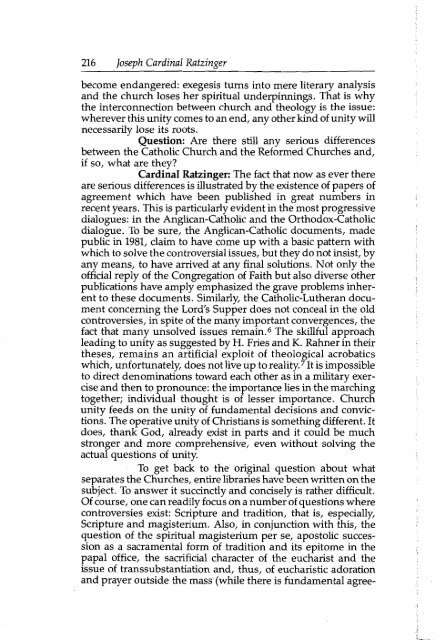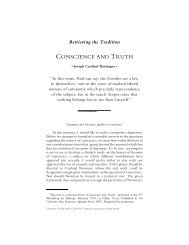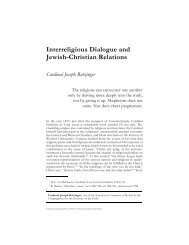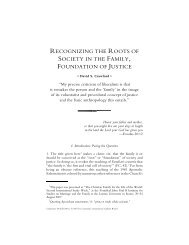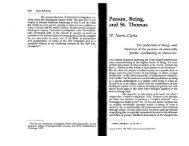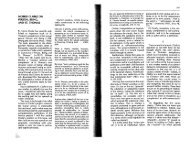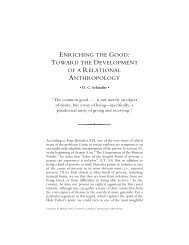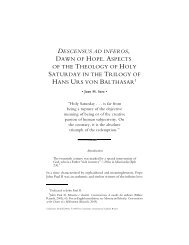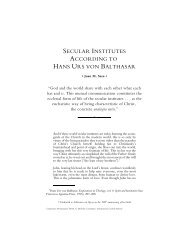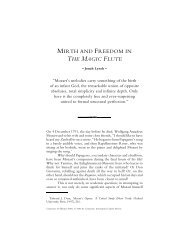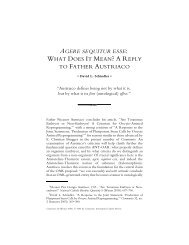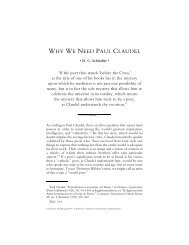Joseph Ratzinger. Luther and the Unity of the Churches. Communio ...
Joseph Ratzinger. Luther and the Unity of the Churches. Communio ...
Joseph Ratzinger. Luther and the Unity of the Churches. Communio ...
You also want an ePaper? Increase the reach of your titles
YUMPU automatically turns print PDFs into web optimized ePapers that Google loves.
216 <strong>Joseph</strong> Cardinal <strong>Ratzinger</strong><br />
become endangered: exegesis turns into mere literary analysis<br />
<strong>and</strong> <strong>the</strong> church loses her spiritual underpinnings. That is why<br />
<strong>the</strong> interconnection between church <strong>and</strong> <strong>the</strong>ology is <strong>the</strong> issue:<br />
wherever this unity comes to an end, any o<strong>the</strong>r kind <strong>of</strong> unity will<br />
necessarily lose its roots.<br />
Question: Are <strong>the</strong>re still any serious differences<br />
between <strong>the</strong> Catholic Church <strong>and</strong> <strong>the</strong> Reformed <strong>Churches</strong> <strong>and</strong>,<br />
if so, what are <strong>the</strong>y<br />
Cardinal <strong>Ratzinger</strong>: The fact that now as ever <strong>the</strong>re<br />
are serious differences is illustrated by <strong>the</strong> existence <strong>of</strong> papers <strong>of</strong><br />
agreement which have been published in great numbers in<br />
recent years. This is particularly evident in <strong>the</strong> most progressive<br />
dialogues: in <strong>the</strong> Anglican-Catholic <strong>and</strong> <strong>the</strong> Orthodox-Catholic<br />
dialogue. To be sure, <strong>the</strong> Anglican-Catholic documents, made<br />
public in 1981, claim to have come up with a basic pattern with<br />
which to solve <strong>the</strong> controversial issues, but <strong>the</strong>y do not insist, by<br />
any means, to have arrived at any final solutions. Not only <strong>the</strong><br />
<strong>of</strong>ficial reply <strong>of</strong> <strong>the</strong> Congregation <strong>of</strong> Faith but also diverse o<strong>the</strong>r<br />
publications have amply emphasized <strong>the</strong> grave problems inherent<br />
to <strong>the</strong>se documents. Similarly, <strong>the</strong> Catholic-<strong>Lu<strong>the</strong>r</strong>an document<br />
concerning <strong>the</strong> Lord's Supper does not conceal in <strong>the</strong> old<br />
controversies, in spite <strong>of</strong> <strong>the</strong> many important convergences, <strong>the</strong><br />
fact that many unsolved issues remain.6 The skillful approach<br />
leading to unity as suggested by H. Fries <strong>and</strong> K. Rahner in <strong>the</strong>ir<br />
<strong>the</strong>ses, remains an artificial exploit <strong>of</strong> <strong>the</strong>ological acrobatics<br />
which, unfortunately, does not live up to reality.7 It is impossible<br />
to direct denominations toward each o<strong>the</strong>r as in a military exercise<br />
<strong>and</strong> <strong>the</strong>n to pronounce: <strong>the</strong> importance lies in <strong>the</strong> marching<br />
toge<strong>the</strong>r; individual thought is <strong>of</strong> lesser importance. Church<br />
unity feeds on <strong>the</strong> unity <strong>of</strong> fundamental decisions <strong>and</strong> convictions.<br />
The operative unity <strong>of</strong> Christians is something different. It<br />
does, thank God, already exist in parts <strong>and</strong> it could be much<br />
stronger <strong>and</strong> more comprehensive, even without solving <strong>the</strong><br />
actual questions <strong>of</strong> unity.<br />
To get back to <strong>the</strong> original question about what<br />
separates <strong>the</strong> <strong>Churches</strong>, entire libraries have been written on <strong>the</strong><br />
subject. To answer it succinctly <strong>and</strong> concisely is ra<strong>the</strong>r difficult.<br />
Of course, one can readily focus on a number <strong>of</strong> questions where<br />
controversies exist: Scripture <strong>and</strong> tradition, that is, especially,<br />
Scripture <strong>and</strong> magisterium. Also, in conjunction with this, <strong>the</strong><br />
question <strong>of</strong> <strong>the</strong> spiritual magisterium per se, apostolic succession<br />
as a sacramental form <strong>of</strong> tradition <strong>and</strong> its epitome in <strong>the</strong><br />
papal <strong>of</strong>fice, <strong>the</strong> sacrificial character <strong>of</strong> <strong>the</strong> eucharist <strong>and</strong> <strong>the</strong><br />
issue <strong>of</strong> transsubstantiation <strong>and</strong>, thus, <strong>of</strong> eucharistic adoration<br />
<strong>and</strong> prayer outside <strong>the</strong> mass (while <strong>the</strong>re is fundamental agree-


